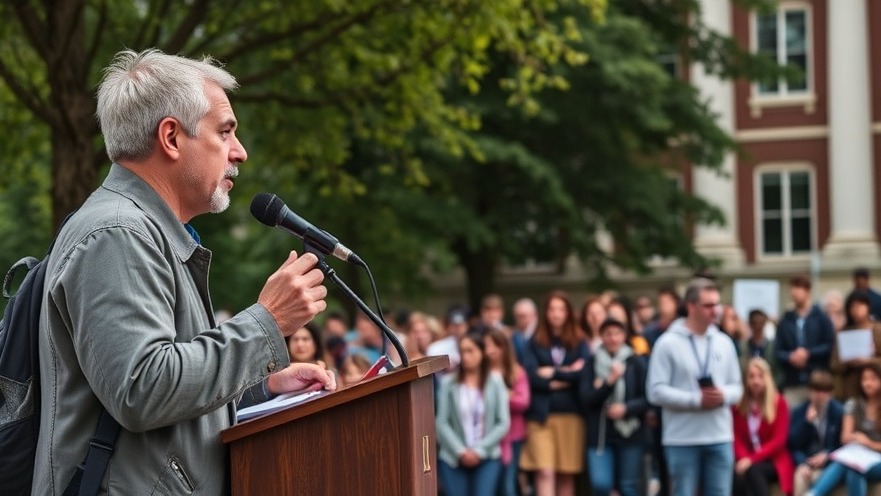
The Divisive Landscape of Free Speech in Texas Higher Education
The recent establishment of committees to explore issues of bias and free speech in Texas colleges has ignited debates at the intersection of politics and education. In light of the tragic killing of conservative activist Charlie Kirk, these committees seek to honor his legacy while addressing widespread criticisms of university faculty and their statements. This controversy highlights the ongoing struggle over what constitutes free speech and bias in academia.
Making Sense of the Motivations Behind the Committees
House Speaker Dustin Burrows and Lt. Gov. Dan Patrick’s decision to form these committees was a response to rising tensions on university campuses, particularly after Kirk's assassination at Utah Valley University. This event has galvanized conservative lawmakers who perceive a growing hostility towards conservative viewpoints in higher education. Burrows articulated his concerns in a press release stating that the public’s negative reaction to Kirk’s death, particularly from some in education, indicates a larger issue within Texas universities.
Online Backlash and Institutional Responses
The scrutiny of university faculty intensified following the viral spread of student criticism towards Kirk and, by extension, conservative ideologies. For instance, a social media video capturing a University of North Texas student accusing peers of celebrating Kirk's death drew ire from lawmakers. The university's swift condemnation showcases an institutional effort to maintain civil discourse and uphold the standards of conduct expected from its students. This incident illustrates the broad societal implications of academic discussions on campus.
Implications for Texas Education and Beyond
This evolving landscape around free speech raises critical questions about academic freedom, educator accountability, and the role of universities in providing a platform for diverse opinions. Additionally, the fallout from some faculty members being dismissed from their positions over social media interactions reflects broader concerns about the chilling effects of scrutiny on academic expression.
National Examination of Educational Bias
The committees formed in Texas are part of a wider national conversation regarding academic bias and freedom of speech, echoing sentiments expressed by various lawmakers and educators across the United States. Given the scrutiny faced by universities, it is essential to balance the need for accountability in educating sensitive social topics while fostering an environment where all perspectives can be explored respectfully. The challenges faced by Texas educational institutions may set a precedent for similar discussions nationwide.
Aiming for Constructive Dialogue Amidst Conflict
While the introduction of these committees stems from tragic circumstances, it opens the floor for potential healing and constructive dialogue. By recognizing the emotional and political weight of Charlie Kirk's death, lawmakers hope to guide conversations about free speech towards a more productive outcome. Striking a balance between the rights of students, faculty, and the broader community will require careful navigation and empathy.
Civic Responsibility in Educational Spaces
Democracy thrives on the exchange of ideas regardless of how contentious they may be. It is imperative for institutions to encourage a culture of openness where students feel empowered to express their viewpoints and engage in debates. As these discussions unfold in Texas, they will undoubtedly influence public opinion and educational policy, forcing us to reconsider how academic settings can best serve a diverse and dynamic society.
In closing, the formation of these committees may lead not only to legislative change in Texas but also serve as a litmus test for other states grappling with similar issues. A proactive stance on balancing free speech and accountability can educate future generations and shape a more inclusive environment for learning.
 Add Element
Add Element  Add Row
Add Row 



Write A Comment